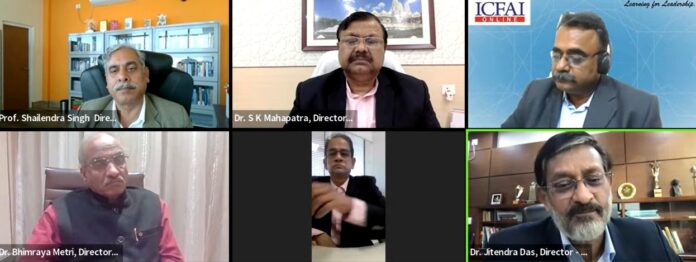India, 14th March 2022: At a recently concluded education conclave, senior representatives of leading business institutes participated in several panel discussions on Placement and Employability of Management Students, Diversity in MBA Classrooms, Role of Internships and Induction Programmes, etc. One of the panel discussions highlighted the perspective of B-schools adapting to Digital University, with directors of prominent MBA institutes weighing in with their opinions. The future of management education conclave 2022 was organized by BW Education.
The panel comprised Dr. Jitendra Das, Director, FORE School of Management, Prof. Shailendra Singh, Director, IIM Ranchi, Dr. Bhimraya Metri, Director, IIM Nagpur, Prof. R S Desikan, Department of Management, SRM University, AP, Dr. S K Mahapatra, Director, KIIT School of Management, KIIT DU, Bhubaneswar, Dr. Sanjay Modi, and Pro-Vice-Chancellor & Executive Dean, Lovely Professional University. The discussion was moderated by Prof. R Prasad, Director (Academic Wing), ICFAI Group.

The pandemic has altered the learning curve with EdTech coming into play. The discussion touched upon the differentiation between digitization, digitalization, and digital transformation with special emphasis on how Industry 4.0 is changing the needs of employers, what kind of employee recruiters are looking for, and the role of institutions to facilitate it.
Dr. Jitendra Das, Director, FORE School of Management explained the difference in education students receive in a business school as compared to other universities. Students usually enroll in universities with the objective of getting a certificate or degree, but, the primary objective of enrolling in a B-school is to get placed in a reputed profile and company. The academic fee in business institutes is high, therefore, the expected delivery of content is superior compared to other educational institutes. Students always calculate the ROI before applying to a B-school which is why management institutes are intensely focused on providing a learning experience. This learning experience is provided from a recruiter’s point of view. There are three crucial components to build a learning experience – the curriculum activity, the co-curriculum activities, and the extracurricular activities. Management quizzes, seminars, panel discussions, workshops are important elements of a learning experience.
“With the pandemic and its subsequent lockdowns, the challenge to provide a learning experience by B-schools increased many folds. At FORE School of Management, we redesigned the mode of delivery by adapting to digital transformation. The objective was to create a classroom experience adjacent to a physical classroom. This included adopting a hybrid form of class, installation of smart TVs and dish film media so that all students can see each other, moving from 4G to 5G connections, etc.”, said Dr. Jitendra Das.
Important Announcement – EasyShiksha has now started Online Internship Program “Ab India Sikhega Ghar Se”
Digital transformation is a dynamic process that requires continuous progress and upgradation. There are several parameters that come to play to enable digital transformation in B-schools. Acceptability of digital classes by students, adaptability of online placements by recruiters, faculty preparedness, and competence are all part and parcel of this transformation. “Faculty training is a major requirement for digital transformation to take place in B-schools. Professors need to be trained to operate in a technology-driven environment so that the learning experience is not compromised”, added Dr. Jitendra Das.
Prof. Shailendra Singh, Director, IIM Ranchi stated that the digital university concept presented in Union Budget 2022 gives a roadmap that education will be democratized and the recent pandemic has shown that all institutes adapted to the circumstance despite infrastructure being a challenge in a country like India. Dr. Bhimraya Metri, Director, IIM Nagpur said that digital university is defined by the digital design and offerings. We have moved from the industrial era to the intelligence era. Transition is difficult and time taking but it is not impossible.
Prof. R S Desikan, Department of Management, SRM University, AP, said the foundation of the curriculum of B-schools is volatile in nature; what is relevant today might not stay relevant in the coming years. The hardware and software requirements need to be identified when institutes move to a hybrid form of education. There is also a need for behavioral and psychological change in the faculty, along with a need to relook at methods to enable outcome-based education. Dr. S K Mahapatra, Director, KIIT School of Management spoke about the existence of a digital divide in the country and connected it to the needs for society and community. With the technology investment happening in the country, this divide will hopefully end soon.
 Online Education Magazine in India, EasyShiksha Magazine
Online Education Magazine in India, EasyShiksha Magazine
Dr. Sanjay Modi, Pro-Vice-Chancellor & Executive Dean, Lovely Professional University concluded the discussion by stating that companies have recruited students even during the pandemic which implies that there is a demand for talent. There was rebalancing in terms of curricular and extra-curricular activity to make up for the lack of campus learning. Digital university brings a lot of faculty challenges to keep students motivated which is why developing interactive modes of teaching is important.
ALSO READ: Over 350 Felicitated at Akshar Yoga’s Teachers Training Certification ceremony 2022
Want to improve your skill visit: EasyShiksha

































































